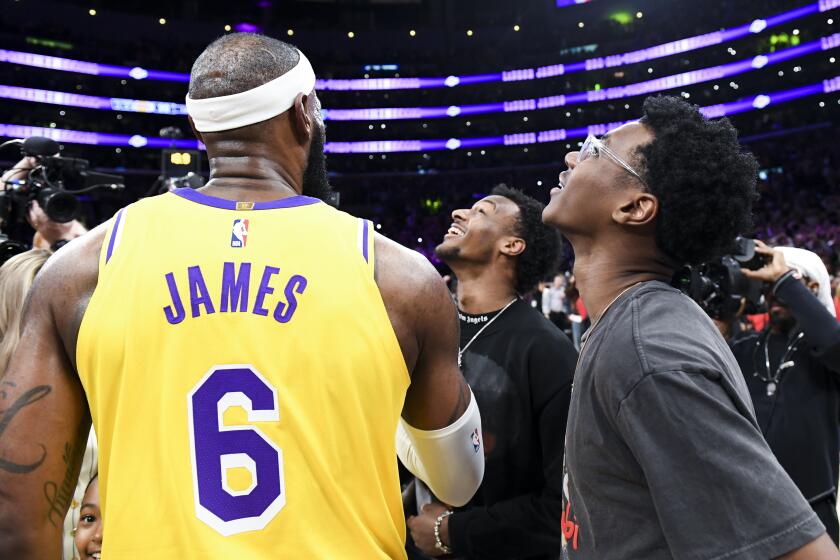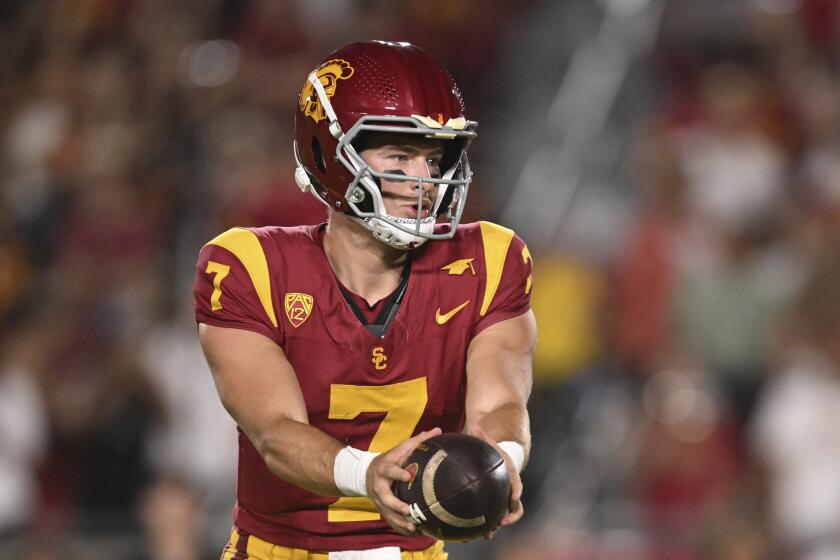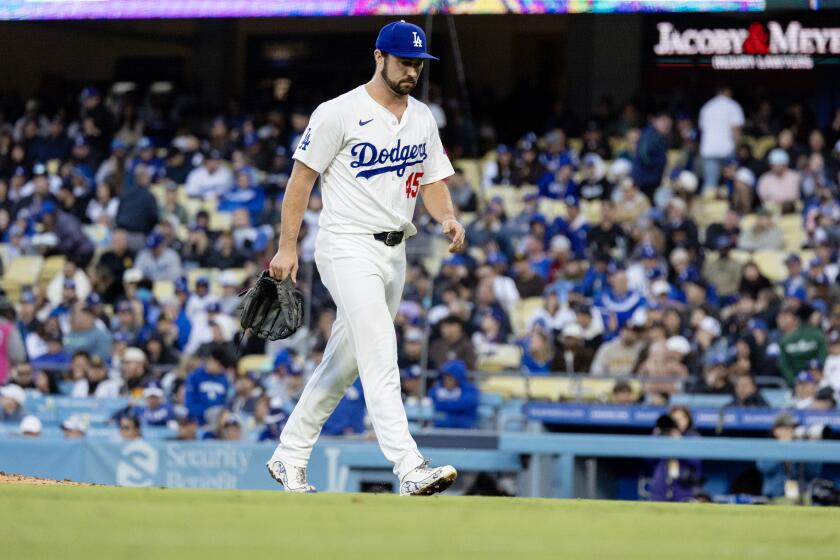‘Damn Yankees’ and the passions they stir
A couple of years ago, for Father’s Day, my family bought me the interactive video game MLB 2K9 for the Wii. The great thing about the game, and also its enduring frustration, is its verisimilitude — playing as the 2009 New York Yankees, I had access to all those players, all that talent, although I often couldn’t make them win. Usually, I’d play against the machine but on occasion with my then-11-year-old daughter, Sophie, an avowed Yankees hater and (even worse) a Red Sox fan.
The first time we played together, I warned her, “Don’t take Boston,” explaining that even a virtual Yankees-Red Sox matchup with my own child could bring out the cold-bloodedness in me. Sure enough, that’s exactly what happened. During the game, in a digital Fenway Park, I tried to keep it friendly, throwing her the occasional meatball, letting her score some runs. But in the eighth inning, with the Yankees leading by three, she hit a two-run homer to bring the Red Sox within one. I looked at her as she did a dance of joy; I might have even said, “Now, it’s serious.” Then, I did what any real Yankees fan would do: I went to the bullpen for Mariano Rivera, and I shut my daughter down.
This edge, this need for victory — what Nathaniel Rich, in his essay “The Queens Speech,” calls “Win At All Costs (WAAC)” — is one of the central subtexts in “Damn Yankees: Twenty-Four Major-League Writers on the World’s Most Loved (and Hated) Team,” edited by former Sports Illustrated executive editor Rob Fleder. What gives the book its resonance, however, is how the best work here tends to turn that on its ear, exposing it as the most obvious and least interesting filter for coming to terms with the team.
Yes, the Yankees are ruthless; yes, as Rich suggests, “There are only three possible outcomes to a Yankees season: embarrassment (2004), disappointment (2005-08, 2010), and satisfaction (2009).” And yet, peer beneath the surface, and you’ll discover something unexpected, that the truest Yankees fans, the “fans of long standing,” are “obsessive, passionate, and most astonishing to me, they live in constant fear. No matter how much success their team has, they still expect the worst.”
Rich is a Mets fan, so he understands a little something about expecting the worst. He also provides one of the few truly contrarian takes in a collection that, subtitle aside, is really more of an inquiry (or set of inquiries) into the complexities and nuances of the Yankees universe. Jane Leavy touches on this in her subtle and moving “Sully and the Mick,” which traces the relationship (such as it was) between Red Sox pitcher Frank Sullivan and Mickey Mantle, who faced each other 79 times between 1953 and 1962. Mantle hit .295 off Sullivan, with seven home runs and 14 strikeouts, but the most telling thing about their mutual history may be the point at which it diverged. “Mantle became a legend,” Leavy writes, “Sully survived. … ‘I had no idea of the misery and suffering the poor bastard went through,’ Sully wrote … ‘If I’d known how tough Mickey’s life had been, I would’ve thrown a few fat ones over the plate.’”
What Leavy is getting at is the afterlife, or the underlife, of a player such as Mantle, the moment everything gets real. It’s easy to overlook beneath the gaudy numbers, all those home runs and World Series titles, but the point is to look at players less as heroes than as human beings. Sometimes, these roles blend, as in Pete Dexter’s “The Errors of Our Ways” or Michael Paterniti’s “Gone Fishin,’” the most vivid efforts here.
In the first, Dexter goes in search of Chuck Knoblauch, the former second baseman who lost his ability to make the throw to first base and then disappeared into a willed obscurity, warning those who knew him: “Don’t tell anybody where I live.” In the second, Paterniti tracks down Catfish Hunter at his home in North Carolina, only months before the pitcher’s death.
Like Knoblauch, Hunter is notoriously thorny; he is also suffering from ALS, better known as Lou Gehrig’s disease, and can no longer use his arms. Yet the man Paterniti discovers is unexpectedly open, facing his diminishment with a fatalistic grace. “I reached down and found his [hand] without thinking,” Paterniti writes, describing a family prayer circle, “the huge paw of his right hand, the one that had delivered the Yankees the impossible 1978 World Series championship with the clinching victory in Game 6, soft now from disuse. What did it feel like to hold that hand? It felt as if some powerful electricity was being transmitted through that circuit of people. … Holding his hand made me their momentary conduit. It felt overwhelming. Then we bowed our heads.” That’s an essential moment, suggesting the deep bonds that baseball forges — the sense of wonder at what Hunter once accomplished, and its inevitable dissolution to an equal sense of loss.
Not all of “Damn Yankees” is so nuanced; some if it is simply fun. In “Media Babe,” Leigh Montville imagines Babe Ruth as a contemporary figure, hounded by the press, exposed on Twitter, his private excesses part of the feeding frenzy of what passes now for public life. Bill James’ “My Season’s Better Than Yours” tracks the 100 best seasons by Yankees catchers (catchers?), deftly blending the sublime and the ridiculous, while Will Leitch’s “An Innocent Abroad” frames a trip to Yankee Stadium as a rite of passage, with the Bleacher Creatures heckling Red Sox right fielder Trot Nixon for being Richard Nixon’s son (he wasn’t).
There are misfires also — particularly Frank Deford’s egregious “A Baltimore Chop,” where in the space of three pages, America’s most overrated sportswriter recycles every dumb cliché about the Yankees (that they overpay their players, that they’re “too good” to have a mascot, that to be a Yankees fan is to support a bully) without bringing any thought or insight to the mix. More disappointing is Colum McCann’s “The Long Way Home,” which, despite the beauty of its language, never transcends its reliance on the stereotype of baseball as a way of becoming an American.
Still, in the end, what lingers about “Damn Yankees” is how few its failures are. That’s a real achievement, especially in regard to the Yankees, about whom so much has been written over the years. The key is the abiding focus on the personal, the understanding that what happens on the field is less important than how we render it our own. This — just ask my daughter — remains the heart of fanhood: That, for better or for worse, the teams we love make us who we are.
More to Read
Get our high school sports newsletter
Prep Rally is devoted to the SoCal high school sports experience, bringing you scores, stories and a behind-the-scenes look at what makes prep sports so popular.
You may occasionally receive promotional content from the Los Angeles Times.







